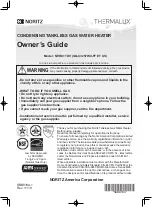
26
Remote Control Installation
and Operation
A
CAUTION:
Before installing remote controls
to the heaters, read the following:
The digital
thermostat model is remote-ready in most cases. The
digital liquid crystal display (LCD) shows the actual pool
temperature, operating status, and service codes. See
Figure 45. The touch pad on the control panel allows
you to select the desired pool or spa temperature. It also
indicates when a remote system is controlling the heater
by displaying
Remote
in the display. When connecting
the heater to a remote system, identify whether it is a
two- or three-wire remote system. Select the appropriate
instruction listed below to properly install the remote to
the heater.
Remote Operation
The heaters are equipped with the ability to work with
external remote controls. The supplied 7-pin remote wiring
connector supplies power out to either a toggle switch or
the switch contacts of a third-party remote. The remote
works by either making or breaking the circuit created
by the remote wiring. Typically, a remote does not supply
power to the heater, it only provides a switching function
to turn the heater On or Off.
If your remote is supplying
its own voltage to the heater, it will not work with this
heater and may damage the digital circuit board.
For operation of the heater using the onboard thermostatic
controls with a time clock.
See "Time Clock/Fireman’s
Switch" on page 28.
OFF Mode
Heating in the POOL Mode
Heating in the SPA Mode
Remote Mode
Figure 45. Remote Control Menu - Remote Operation
Activating the Remote
To activate or deactivate the remote function:
1. Press and hold the UP and DOWN arrow buttons for
3 to 5 seconds.
The second line of the display will alternate even when the
unit is off (“No Demand”).
NOTE:
When in remote operation, the keypad mode and
temp buttons are disabled.
Figure 46. Remote Control Menu - Activation
Remote Control Wiring
ATTENTION
OBSERVE PRECAUTIONS
ELECTROSTATIC
SENSITIVE DEVICES
A
CAUTION:
Electrostatic Discharge (ESD) damage
can be caused by direct or indirect contact with the
wiring or circuit board. When one walks to the heater
area, an electrostatic charge accumulates on the body.
Contact of a finger allows the body to discharge, possibly
causing device damage. This damage can be limited if
the service person discharges himself, following ESD
preventive/removal practices, and holds on to the heater
enclosure for 5 seconds before proceeding.
Important Installation Notes for Remote or External
Wiring Configuration:
• Remote wiring must be run in a separate conduit.
• Remote wiring must not be run parallel to high voltage
lines.
• For runs of under 30' (9 m), remote wiring should
have stranded conductors with a minimum of 22
AWG, 600V, cable twisting 1.5" to 2.5" (3.8 to 6.4 cm)
lay and jacketed.
• For runs over 30' (9 m), the conductors should be a
minimum of 20 AWG, 600V, cable twisting 1.5" to 2.5"
(3.8 to 6.4 cm) lay that is shielded and jacketed.
• Maximum cable length is 200' (61 m).
• For both two- and three-wire remote systems, the
provided 7-pin wiring connector must be utilized.
Содержание 207A
Страница 21: ...21 6 WIRING DIAGRAM...
Страница 46: ...46 NOTES...
Страница 47: ...47 NOTES...
Страница 48: ......
















































